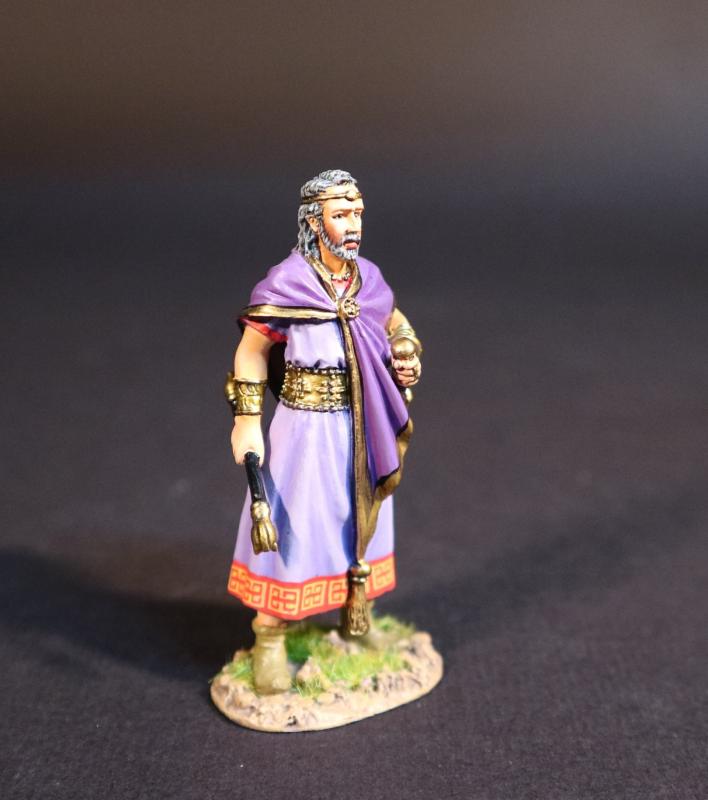King Priam of Troy, Troy and Her Allies, The Trojan War--single figure with scepter
$56.00
Item Number: TWT-01
King Priam of Troy, Troy and Her Allies, The Trojan War--single figure with scepter
THE TROJAN WAR
THE TROJANS
Traditionally, the Trojan War arose from a sequence of events beginning with a quarrel between the goddesses Hera, Athena, and Aphrodite. Eris the goddess of discord, was not invited to the wedding of Peleus and Thetis, and so arrived bearing a gift: A golden apple, inscribed “for the fairest”.
Each of the goddesses claimed to be the “fairest”, and the rightful owner of the apple. They submitted the judgement to a shepherd they encountered tending his flock. Each of the goddesses promised the young man a boon in return for his favour. Power, wisdom, or love. The youth, in fact Paris, a Trojan prince who had been raised in the countryside, chose love, and awarded the apple to Aphrodite.
As his reward, Aphrodite caused Helen, the Queen of Sparta, and the most beautiful of all women, to fall in love with Paris.
The judgement of Paris earned him the ire of both Hera and Athena, and when Helen left her husband, Menelaus, the Spartan king, for Paris of Troy, Menelaus called upon all the kings and princes of Greece to wage war upon Troy.
Menelaus’ brother Agamemnon King of Mycenae, led an expedition of Achaean troops to Troy and besieged the city for ten years because of Paris’ insult. After the death of many heroes, including the Achaeans, Achilles and Ajax and the Trojans Hector and Paris, the city fell to the ruse of the Trojan Horse. The Achaeans slaughtered the Trojans, except for some of the women and children whom they kept or sold as slaves. They desecrated the temples, thus earning the wrath of the gods.
Few of the Achaeans returned safely to their homes, and many founded colonies in distant shores. The Romans later traced their origin to Aeneas, Aphrodite’s son and one of the Trojans, who was said to have led the surviving Trojans to modern day Italy.
The Trojans, too had their semi-divine heroes and these included Hector (son of Priam), Aeneas, Sarpedon, and Glaucus, just to name a few. They also had help from the gods, receiving assistance during the battle from Apollo, Aphrodite, Ares and Leto.
The Trojan army defending the great city of Troy, led by their king Priam, had assistance from a long list of allies. These included the Lycians, which was a maritime district in south western Anatolia (now Turkey). It was situated along the Mediterranean coast between Caria and Pamphylia, and extended inland to the ridge of the Taurus Mountains.
KING PRIAM OF TROY
Priam was the legendary and last king of Troy during the Trojan War. He was the son of Laomedon. The many children of Priam included notable characters such as Hector, Paris, and Cassandra.
Initially Priam was named Podarces, and his change of name has to do with the actions of the Greek hero Heracles and Priam’s father, Laomedon.
Heracles came to Troy when the city was under attack by disease and a sea monster, the attacks being the retribution of Poseidon and Apollo, after Laomedon had refused to pay them for work done. Heracles promised Laomedon to free Troy from the attacks, if the king would promise to give him the swift horses of Troy in payment.
Laomedon agreed to the deal and on the beach outside of Troy, Heracles slew the sea monster after three days of fighting. With the death of the monster, the pestilence also left Troy, but when Heracles went to Laomedon to take payment, the king refused and locked the city gates against the hero.
Heracles would later return to Troy with several ships of men, including Telamon, and the hero laid siege to the city. Heracles would eventually enter the city, and the Greek hero killed Laomedon. The sons of the king were also killed by Heracles, until only the youngest, Podarces was left alive. He too would have died at the hands of Heracles, but Hesione, the sister of Podarces, stayed the hand of Heracles, by offering up a ransom for her brother; the ransom taking the form of a golden veil. Podarces would then take the name Priam, meaning “ransomed”.
Having had his life spared, Priam then found himself elevated to king status, for Heracles put the Trojan prince upon the throne, making him ruler of Troy.
Troy would prosper under the leadership of Priam, the city’s walls were rebuilt, and the military strength of Troy would grow. Priam was even said to have led the forces of Troy when allied with the Phrygians in a war against the Amazons.
As money flowed into Troy, through trade, so Priam built himself a magnificent palace: a palace built from brilliant white marble, comprising many hundreds of different rooms.
Priam is killed during the sack of troy, by Achilles’ son Neoptolemus. In Virgil’s description, Neoptolemus first kills Priam’s son Polites in front of his father as he seeks sanctuary on the altar of Zeus. Priam rebukes Neoptolemus, throwing a spear at him, harmlessly hitting his shield. Priam is then dragged by Neoptolemus to the altar and there kills him.
Priam’s death is alternatively depicted on some Greek vases, where Neoptolemus clubs Priam to death with the corpse of the latter’s baby grandson, Astyanax.
DECEMBER 2024.
